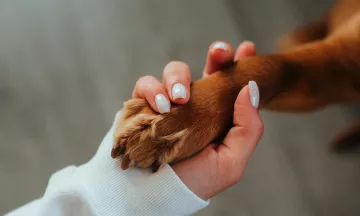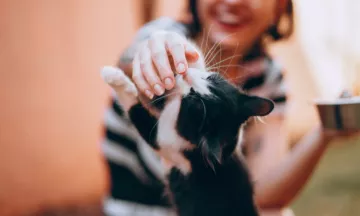In an earlier blog post, we spoke about the fact that being a pet sitter is a job with a lot of responsibility that requires solid preparation. That’s why it’s important to ask the right questions during your meet & greet before booking home dog boarding at Pawshake. But what exactly should you be talking about? As many things as possible ... be curious and get chatting!
Your dog’s behaviour
Before arranging dog boarding, tell the sitter about your dog’s character traits - in honest detail. Are they a happy and energetic pup? Or a little older? What toys do they like? How do they behave around children, other dogs or cats? Does your dog have good leash manners? Is your dog independent or a little shy? Do they like car rides? In what situations do they bark? Do they like cuddles, or not so much? Do they beg? Do they sometimes chew things up? You name it ... The dog sitter will want to know about it!
What does a regular day look like for your dog?
Tell the dog sitter exactly what your dog’s daily routine is. How often do you go for a walk, where, and at what time? Tell them when your dog is usually fed, what food they get and how much, whether they need any medicine or have any other health issues. Tell them when your dog sleeps and when they are active, what their favourite spot is, where they sleep at night, whether they can be left at home on their own and for how long.
It is important to stick to the dog’s routine as closely as possible during the stay, so share this information with the dog sitter.
What does a regular day for the dog sitter look like?
Ask the dog sitter what their plans are during the booking period. Do they have any activities planned during the day, and how does your dog fit into the picture? Will the dog have to be alone in the dog sitter’s home and how do you feel about that? Even if you have an “easy” dog, a stay at somebody else’s home can be a little stressful.
Make sure your dog will get enough attention during the home boarding stay. Ask whether you can see the entire house, so you get an idea of the environment your dog will be staying in. Where will your dog be allowed to go and can they pick their own place to sleep?
Ask as many questions as you want: it will, after all, be a temporary home for your dog!

Discuss the rules
Tell the sitter what cues your dog knows and let them practice with your dog: they will become more familiar with one another this way. Reward your dog with a treat or praise if it works. Talk about the rules your dog knows from home and also the rules at the pet sitter’s home. Perhaps your dog is allowed on the couch at your place, but not at the pet sitter's.
Dogs can cope just fine with different rules at different places, but they do need time to learn the new set of rules. Never punish your dog if they don't get it right away. They're not doing it to annoy you, so just show them what is expected by rewarding good behaviour instead of telling them off.
Walkies: what to look out for
Is your dog used to being off-leash? Even dogs who listen very well to their owner can behave very differently when they’re out with somebody else. A responsible pet sitter puts the dog’s safety first and will only let them off in a safe and fenced area. Tell the dog sitter about your dog’s behaviour when outside, what they like and what they are afraid of.
As a dog sitter, are you planning on taking your dog to the park by car? Secure the dog in the car, either by using a travel crate (if the owner has one and leaves it with you) or a car harness. This is not just safer during the ride, it also prevents the dog from jumping out as soon as you open the door.
Having a dog secured in a car is the law in Australia, and you can be fined if a dog isn't safely restrained.
The dog sitter’s experience
Ask the sitter for an overview of their experience with dogs. How many years of experience do they have? Do they have experience boarding large dogs, small dogs, different breeds? Do they often take care of pets? What do they know about dog body language? What would they do if your dog became stressed or afraid? Ask away - the more you know about the dog sitter’s knowledge and experience, the better.
Expect the unexpected
Any dog can show unexpected behaviour when put into an unfamiliar situation such as an overnight stay. They can show fear or stress, exhibit separation anxiety, behave differently towards children and other dogs or even try to run away. Be aware that these are all real possibilities, so it's important to ask the sitter how they would handle the situation - and of course, what you would expect. If you want to know more about how your dog will behave when you’re away, schedule a trial dog boarding booking!

How do we stay in contact?
Talk about practical matters such as the drop-off, handing over your vet’s contact info and the dog’s vaccination information (and of course, make sure your dog is microchipped and registered beforehand). Discuss how the owner would like to be kept in the loop during the dog boarding - the sitter is expected to send a message and picture to you every day to keep you updated.
Last, but not least: listen to your instincts
It’s all about being comfortable with the pet sitter and being able to trust that the dog boarding experience will go smoothly. As a dog sitter, it’s important to have a clear, positive relationship with the owner. Be curious and open with each other. Do you find it all quite exciting? Makes sense! After all, you’re meeting someone for the first time, and many good friends are made every day through Pawshake. To make life a little easier, you can write down a list of the things you want to ask, or print this article and take it along to the meet and greet.
Find home dog boarding in your area on Pawshake.





